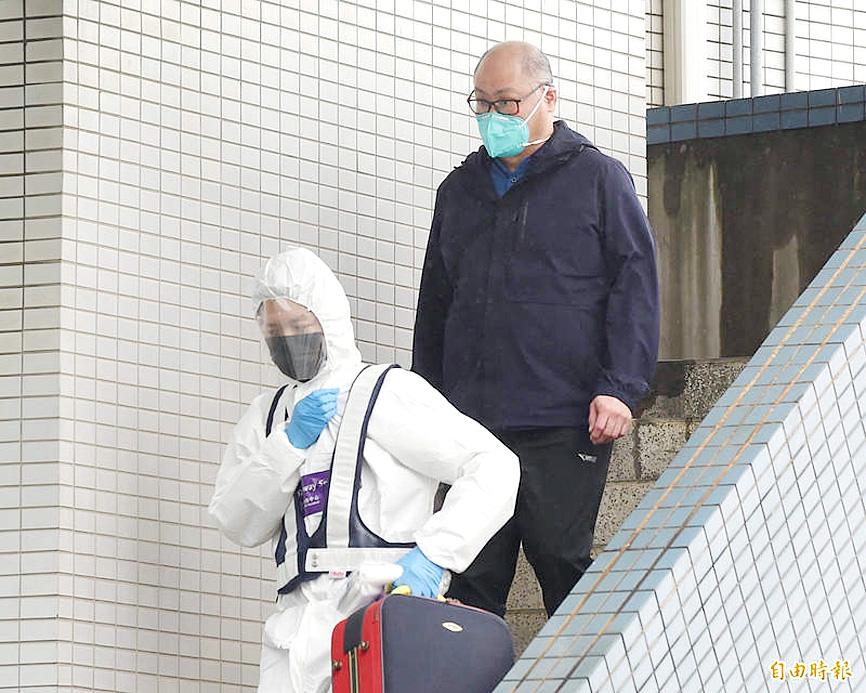Taiwanese democracy advocate Lee Ming-che (李明哲) yesterday in a statement credited US adherence to the Taiwan Relations Act (TRA) for his release and humane treatment while incarcerated in a Chinese prison.
Lee is in quarantine after returning to Taiwan on Friday following a five-year prison sentence in China for “subversion of state power.”
Writing on Facebook, Lee and his wife, Lee Ching-yu (李凈瑜), said that US assistance had come as “precious air to a suffocating man.”

Photo: Chu Pei-hsiung, Taipei Times
“That Lee Ming-che could safely return to Taiwan and was spared the worst abuses while imprisoned have to do, in great measure, to the US’ implementation of the [act], proving that it is not empty rhetoric, but a most precious foundation of Taiwan-US relations,” the couple wrote.
Lee Ching-yu had met many US lawmakers and human rights officials during her campaign to free her husband, including testifying before the US Congress and meeting White House officials, they said.
US lawmakers and officials in their interactions with Lee Ching-yu — repeatedly and without prompting — brought up Section II of the act as stipulating their country’s duty to safeguard human rights in Taiwan, the couple wrote.
The section says: “The preservation and enhancement of the human rights of all the people on Taiwan are hereby reaffirmed as objectives of the US.”
The couple wrote: “As we thank the US government, we cannot help but note that China is continuously violating the human rights of all Taiwanese and perpetuating lies about exercising sovereignty over Taiwan.”
The couple also thanked the US Department of State for its well wishes, after department spokesman Ned Price on Monday wrote on Twitter: “The United States celebrates the release and homecoming of Taiwanese democracy activist Lee Ming-che after five years of unjust detainment in a People’s Republic of China prison for human rights advocacy.”

US President Donald Trump yesterday announced sweeping "reciprocal tariffs" on US trading partners, including a 32 percent tax on goods from Taiwan that is set to take effect on Wednesday. At a Rose Garden event, Trump declared a 10 percent baseline tax on imports from all countries, with the White House saying it would take effect on Saturday. Countries with larger trade surpluses with the US would face higher duties beginning on Wednesday, including Taiwan (32 percent), China (34 percent), Japan (24 percent), South Korea (25 percent), Vietnam (46 percent) and Thailand (36 percent). Canada and Mexico, the two largest US trading

AIR SUPPORT: The Ministry of National Defense thanked the US for the delivery, adding that it was an indicator of the White House’s commitment to the Taiwan Relations Act Deputy Minister of National Defense Po Horng-huei (柏鴻輝) and Representative to the US Alexander Yui on Friday attended a delivery ceremony for the first of Taiwan’s long-awaited 66 F-16C/D Block 70 jets at a Lockheed Martin Corp factory in Greenville, South Carolina. “We are so proud to be the global home of the F-16 and to support Taiwan’s air defense capabilities,” US Representative William Timmons wrote on X, alongside a photograph of Taiwanese and US officials at the event. The F-16C/D Block 70 jets Taiwan ordered have the same capabilities as aircraft that had been upgraded to F-16Vs. The batch of Lockheed Martin

GRIDLOCK: The National Fire Agency’s Special Search and Rescue team is on standby to travel to the countries to help out with the rescue effort A powerful earthquake rocked Myanmar and neighboring Thailand yesterday, killing at least three people in Bangkok and burying dozens when a high-rise building under construction collapsed. Footage shared on social media from Myanmar’s second-largest city showed widespread destruction, raising fears that many were trapped under the rubble or killed. The magnitude 7.7 earthquake, with an epicenter near Mandalay in Myanmar, struck at midday and was followed by a strong magnitude 6.4 aftershock. The extent of death, injury and destruction — especially in Myanmar, which is embroiled in a civil war and where information is tightly controlled at the best of times —

China's military today said it began joint army, navy and rocket force exercises around Taiwan to "serve as a stern warning and powerful deterrent against Taiwanese independence," calling President William Lai (賴清德) a "parasite." The exercises come after Lai called Beijing a "foreign hostile force" last month. More than 10 Chinese military ships approached close to Taiwan's 24 nautical mile (44.4km) contiguous zone this morning and Taiwan sent its own warships to respond, two senior Taiwanese officials said. Taiwan has not yet detected any live fire by the Chinese military so far, one of the officials said. The drills took place after US Secretary